Healthcare Ethics Debate: Voluntary Stopping of Eating and Drinking
VerifiedAdded on 2023/01/16
|5
|1083
|52
Discussion Board Post
AI Summary
This assignment presents a detailed argument against the view that voluntary stopping of eating and drinking (VSED) by patients with life-limiting illnesses is not a form of suicide. The author refutes the opposing viewpoint, arguing against utilitarian ethics, questioning patient consent, and challenging the concept of a 'right to die with dignity.' The author emphasizes the potential for medical advancements, the importance of assessing a patient's mental state, and the inherent biological drive for survival. Furthermore, the author contends that VSED violates the core principles of healthcare professionals, particularly beneficence and non-maleficence, and aligns with the definition of suicide. The author supports their claims with references to relevant literature, professional codes, and ethical frameworks, concluding that VSED is indeed a form of suicide.
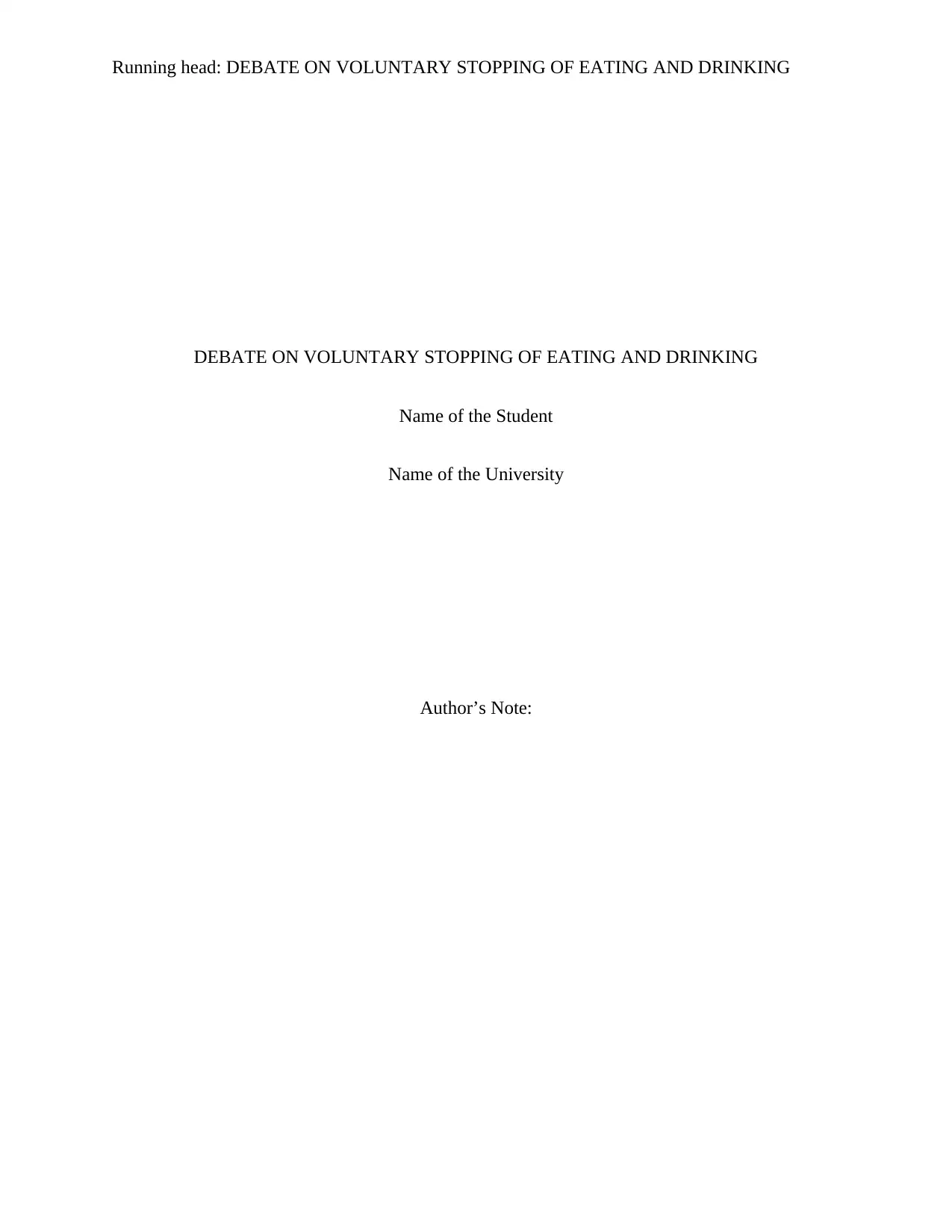
Running head: DEBATE ON VOLUNTARY STOPPING OF EATING AND DRINKING
DEBATE ON VOLUNTARY STOPPING OF EATING AND DRINKING
Name of the Student
Name of the University
Author’s Note:
DEBATE ON VOLUNTARY STOPPING OF EATING AND DRINKING
Name of the Student
Name of the University
Author’s Note:
Paraphrase This Document
Need a fresh take? Get an instant paraphrase of this document with our AI Paraphraser
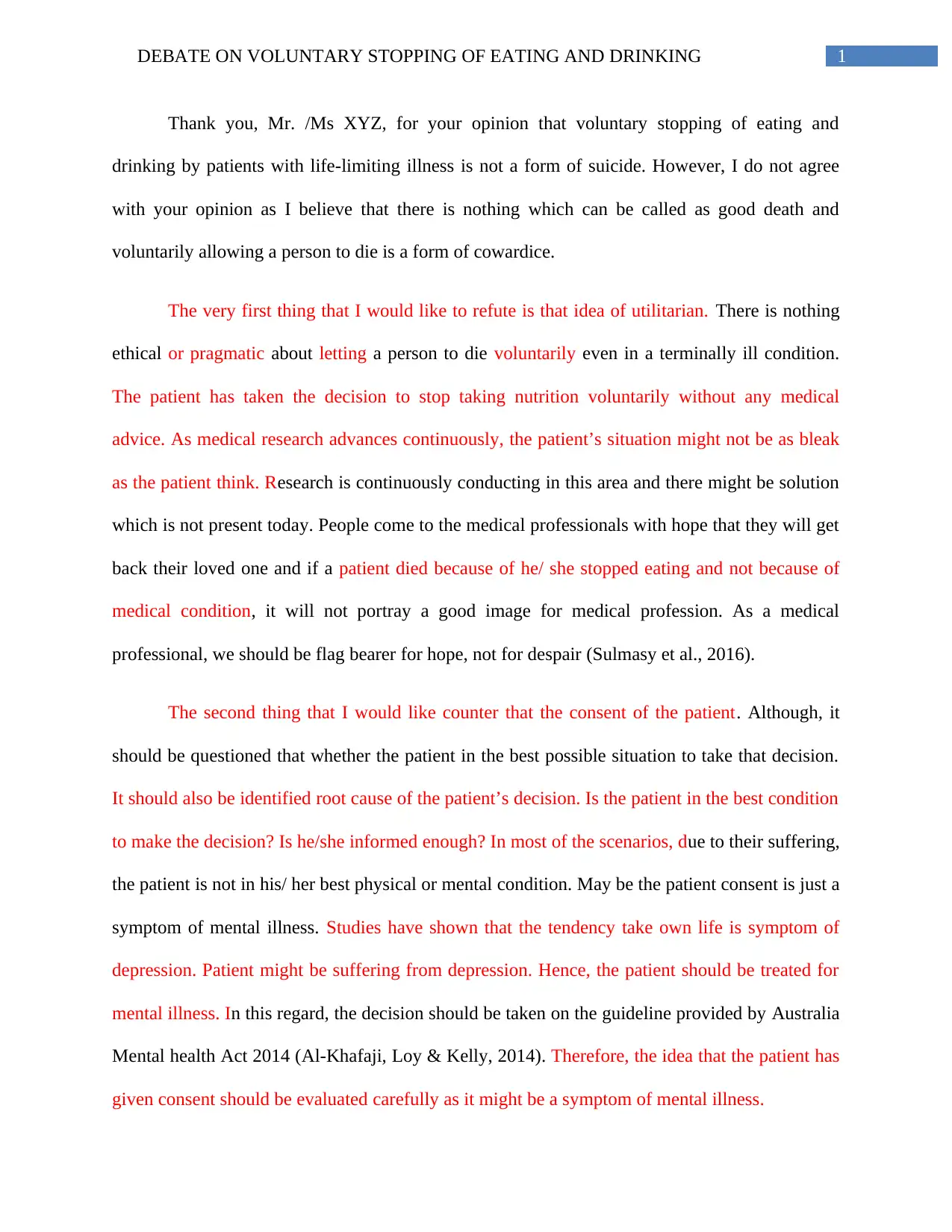
1DEBATE ON VOLUNTARY STOPPING OF EATING AND DRINKING
Thank you, Mr. /Ms XYZ, for your opinion that voluntary stopping of eating and
drinking by patients with life-limiting illness is not a form of suicide. However, I do not agree
with your opinion as I believe that there is nothing which can be called as good death and
voluntarily allowing a person to die is a form of cowardice.
The very first thing that I would like to refute is that idea of utilitarian. There is nothing
ethical or pragmatic about letting a person to die voluntarily even in a terminally ill condition.
The patient has taken the decision to stop taking nutrition voluntarily without any medical
advice. As medical research advances continuously, the patient’s situation might not be as bleak
as the patient think. Research is continuously conducting in this area and there might be solution
which is not present today. People come to the medical professionals with hope that they will get
back their loved one and if a patient died because of he/ she stopped eating and not because of
medical condition, it will not portray a good image for medical profession. As a medical
professional, we should be flag bearer for hope, not for despair (Sulmasy et al., 2016).
The second thing that I would like counter that the consent of the patient. Although, it
should be questioned that whether the patient in the best possible situation to take that decision.
It should also be identified root cause of the patient’s decision. Is the patient in the best condition
to make the decision? Is he/she informed enough? In most of the scenarios, due to their suffering,
the patient is not in his/ her best physical or mental condition. May be the patient consent is just a
symptom of mental illness. Studies have shown that the tendency take own life is symptom of
depression. Patient might be suffering from depression. Hence, the patient should be treated for
mental illness. In this regard, the decision should be taken on the guideline provided by Australia
Mental health Act 2014 (Al-Khafaji, Loy & Kelly, 2014). Therefore, the idea that the patient has
given consent should be evaluated carefully as it might be a symptom of mental illness.
Thank you, Mr. /Ms XYZ, for your opinion that voluntary stopping of eating and
drinking by patients with life-limiting illness is not a form of suicide. However, I do not agree
with your opinion as I believe that there is nothing which can be called as good death and
voluntarily allowing a person to die is a form of cowardice.
The very first thing that I would like to refute is that idea of utilitarian. There is nothing
ethical or pragmatic about letting a person to die voluntarily even in a terminally ill condition.
The patient has taken the decision to stop taking nutrition voluntarily without any medical
advice. As medical research advances continuously, the patient’s situation might not be as bleak
as the patient think. Research is continuously conducting in this area and there might be solution
which is not present today. People come to the medical professionals with hope that they will get
back their loved one and if a patient died because of he/ she stopped eating and not because of
medical condition, it will not portray a good image for medical profession. As a medical
professional, we should be flag bearer for hope, not for despair (Sulmasy et al., 2016).
The second thing that I would like counter that the consent of the patient. Although, it
should be questioned that whether the patient in the best possible situation to take that decision.
It should also be identified root cause of the patient’s decision. Is the patient in the best condition
to make the decision? Is he/she informed enough? In most of the scenarios, due to their suffering,
the patient is not in his/ her best physical or mental condition. May be the patient consent is just a
symptom of mental illness. Studies have shown that the tendency take own life is symptom of
depression. Patient might be suffering from depression. Hence, the patient should be treated for
mental illness. In this regard, the decision should be taken on the guideline provided by Australia
Mental health Act 2014 (Al-Khafaji, Loy & Kelly, 2014). Therefore, the idea that the patient has
given consent should be evaluated carefully as it might be a symptom of mental illness.
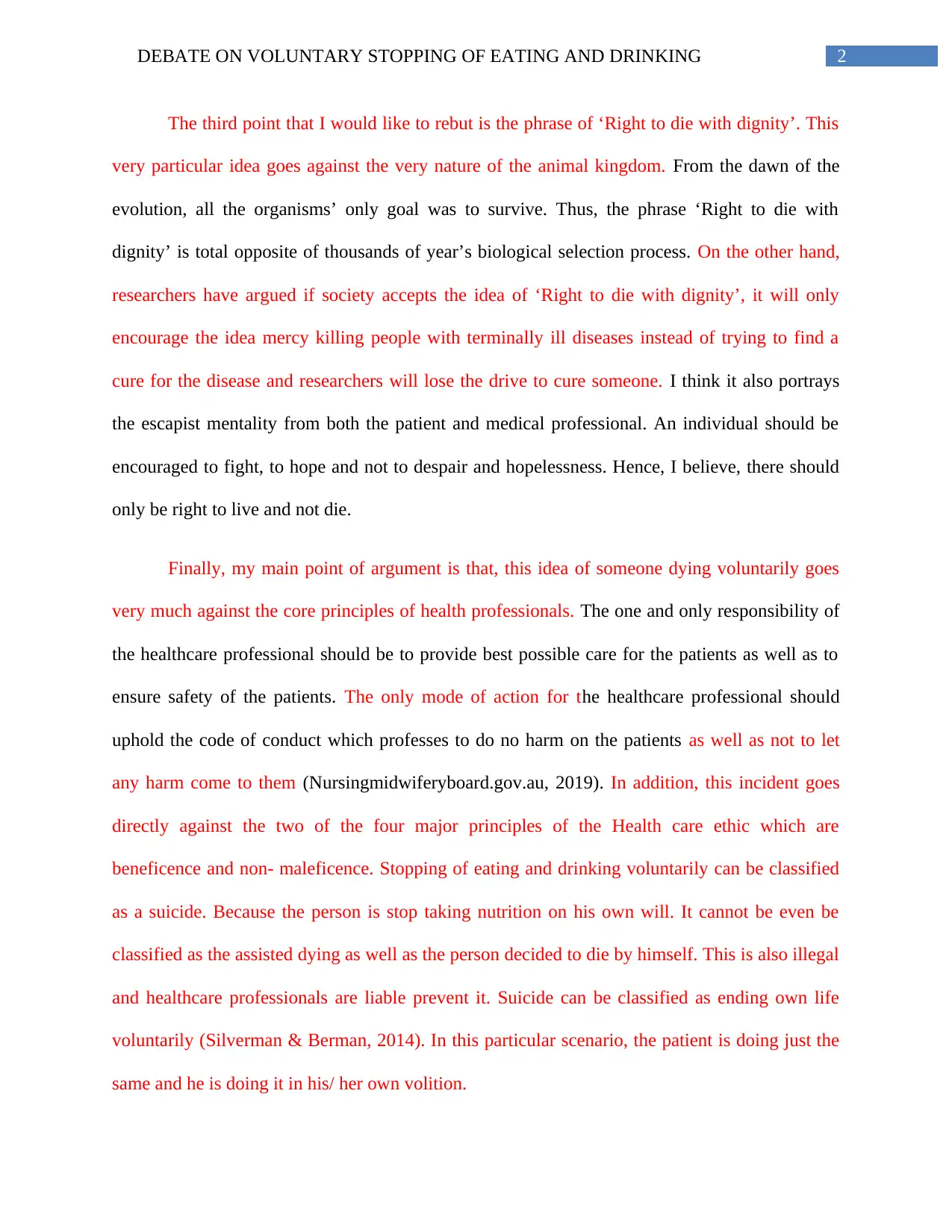
2DEBATE ON VOLUNTARY STOPPING OF EATING AND DRINKING
The third point that I would like to rebut is the phrase of ‘Right to die with dignity’. This
very particular idea goes against the very nature of the animal kingdom. From the dawn of the
evolution, all the organisms’ only goal was to survive. Thus, the phrase ‘Right to die with
dignity’ is total opposite of thousands of year’s biological selection process. On the other hand,
researchers have argued if society accepts the idea of ‘Right to die with dignity’, it will only
encourage the idea mercy killing people with terminally ill diseases instead of trying to find a
cure for the disease and researchers will lose the drive to cure someone. I think it also portrays
the escapist mentality from both the patient and medical professional. An individual should be
encouraged to fight, to hope and not to despair and hopelessness. Hence, I believe, there should
only be right to live and not die.
Finally, my main point of argument is that, this idea of someone dying voluntarily goes
very much against the core principles of health professionals. The one and only responsibility of
the healthcare professional should be to provide best possible care for the patients as well as to
ensure safety of the patients. The only mode of action for the healthcare professional should
uphold the code of conduct which professes to do no harm on the patients as well as not to let
any harm come to them (Nursingmidwiferyboard.gov.au, 2019). In addition, this incident goes
directly against the two of the four major principles of the Health care ethic which are
beneficence and non- maleficence. Stopping of eating and drinking voluntarily can be classified
as a suicide. Because the person is stop taking nutrition on his own will. It cannot be even be
classified as the assisted dying as well as the person decided to die by himself. This is also illegal
and healthcare professionals are liable prevent it. Suicide can be classified as ending own life
voluntarily (Silverman & Berman, 2014). In this particular scenario, the patient is doing just the
same and he is doing it in his/ her own volition.
The third point that I would like to rebut is the phrase of ‘Right to die with dignity’. This
very particular idea goes against the very nature of the animal kingdom. From the dawn of the
evolution, all the organisms’ only goal was to survive. Thus, the phrase ‘Right to die with
dignity’ is total opposite of thousands of year’s biological selection process. On the other hand,
researchers have argued if society accepts the idea of ‘Right to die with dignity’, it will only
encourage the idea mercy killing people with terminally ill diseases instead of trying to find a
cure for the disease and researchers will lose the drive to cure someone. I think it also portrays
the escapist mentality from both the patient and medical professional. An individual should be
encouraged to fight, to hope and not to despair and hopelessness. Hence, I believe, there should
only be right to live and not die.
Finally, my main point of argument is that, this idea of someone dying voluntarily goes
very much against the core principles of health professionals. The one and only responsibility of
the healthcare professional should be to provide best possible care for the patients as well as to
ensure safety of the patients. The only mode of action for the healthcare professional should
uphold the code of conduct which professes to do no harm on the patients as well as not to let
any harm come to them (Nursingmidwiferyboard.gov.au, 2019). In addition, this incident goes
directly against the two of the four major principles of the Health care ethic which are
beneficence and non- maleficence. Stopping of eating and drinking voluntarily can be classified
as a suicide. Because the person is stop taking nutrition on his own will. It cannot be even be
classified as the assisted dying as well as the person decided to die by himself. This is also illegal
and healthcare professionals are liable prevent it. Suicide can be classified as ending own life
voluntarily (Silverman & Berman, 2014). In this particular scenario, the patient is doing just the
same and he is doing it in his/ her own volition.
⊘ This is a preview!⊘
Do you want full access?
Subscribe today to unlock all pages.

Trusted by 1+ million students worldwide
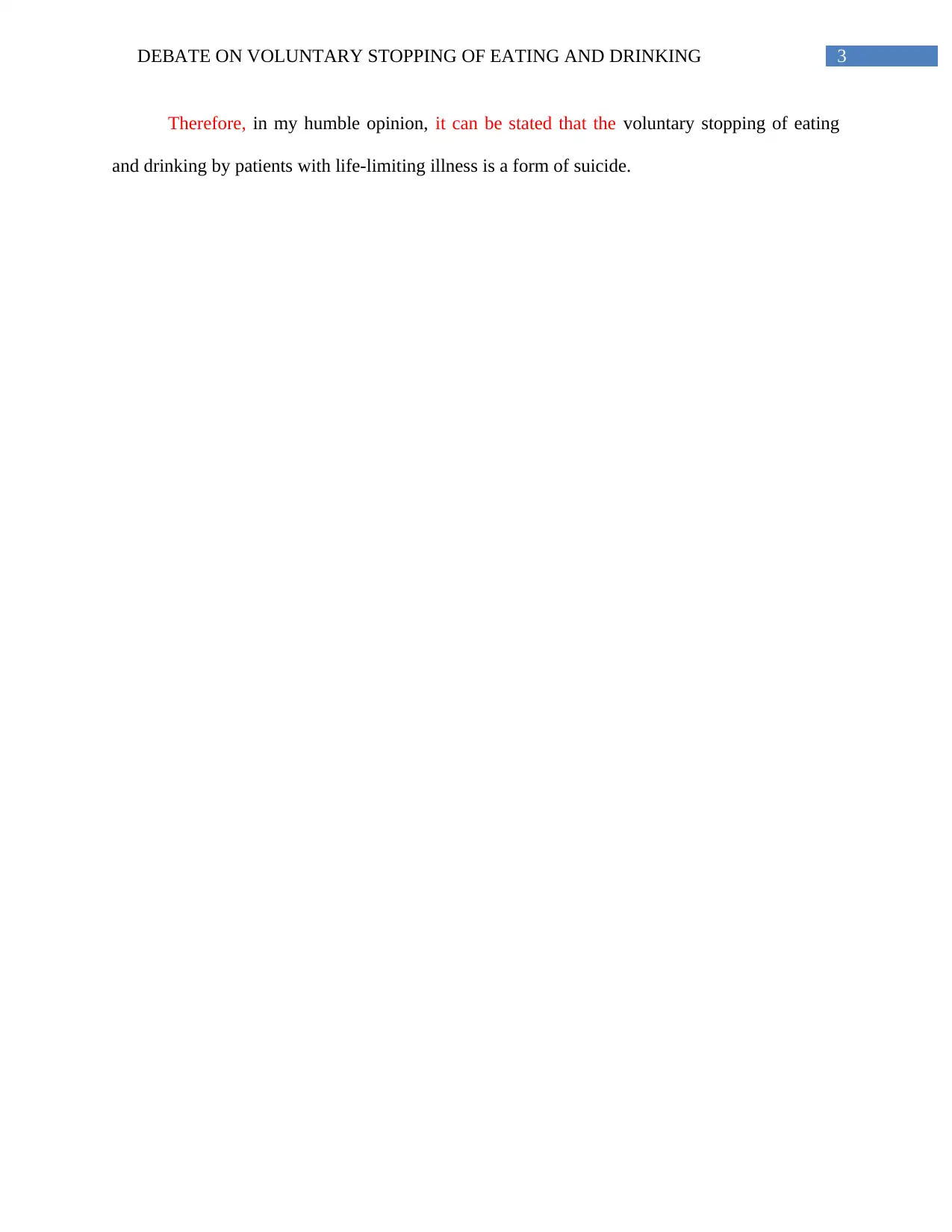
3DEBATE ON VOLUNTARY STOPPING OF EATING AND DRINKING
Therefore, in my humble opinion, it can be stated that the voluntary stopping of eating
and drinking by patients with life-limiting illness is a form of suicide.
Therefore, in my humble opinion, it can be stated that the voluntary stopping of eating
and drinking by patients with life-limiting illness is a form of suicide.
Paraphrase This Document
Need a fresh take? Get an instant paraphrase of this document with our AI Paraphraser
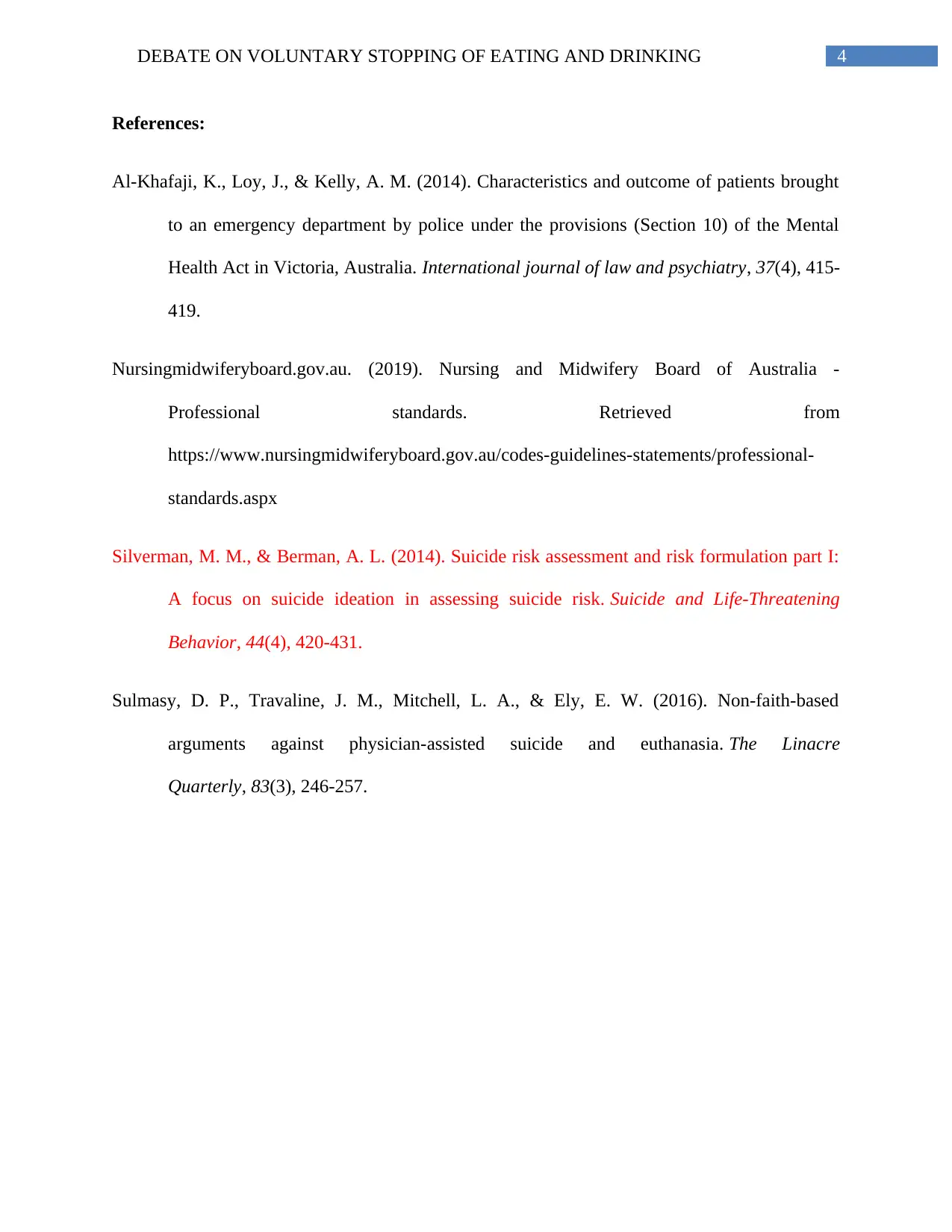
4DEBATE ON VOLUNTARY STOPPING OF EATING AND DRINKING
References:
Al-Khafaji, K., Loy, J., & Kelly, A. M. (2014). Characteristics and outcome of patients brought
to an emergency department by police under the provisions (Section 10) of the Mental
Health Act in Victoria, Australia. International journal of law and psychiatry, 37(4), 415-
419.
Nursingmidwiferyboard.gov.au. (2019). Nursing and Midwifery Board of Australia -
Professional standards. Retrieved from
https://www.nursingmidwiferyboard.gov.au/codes-guidelines-statements/professional-
standards.aspx
Silverman, M. M., & Berman, A. L. (2014). Suicide risk assessment and risk formulation part I:
A focus on suicide ideation in assessing suicide risk. Suicide and Life‐Threatening
Behavior, 44(4), 420-431.
Sulmasy, D. P., Travaline, J. M., Mitchell, L. A., & Ely, E. W. (2016). Non-faith-based
arguments against physician-assisted suicide and euthanasia. The Linacre
Quarterly, 83(3), 246-257.
References:
Al-Khafaji, K., Loy, J., & Kelly, A. M. (2014). Characteristics and outcome of patients brought
to an emergency department by police under the provisions (Section 10) of the Mental
Health Act in Victoria, Australia. International journal of law and psychiatry, 37(4), 415-
419.
Nursingmidwiferyboard.gov.au. (2019). Nursing and Midwifery Board of Australia -
Professional standards. Retrieved from
https://www.nursingmidwiferyboard.gov.au/codes-guidelines-statements/professional-
standards.aspx
Silverman, M. M., & Berman, A. L. (2014). Suicide risk assessment and risk formulation part I:
A focus on suicide ideation in assessing suicide risk. Suicide and Life‐Threatening
Behavior, 44(4), 420-431.
Sulmasy, D. P., Travaline, J. M., Mitchell, L. A., & Ely, E. W. (2016). Non-faith-based
arguments against physician-assisted suicide and euthanasia. The Linacre
Quarterly, 83(3), 246-257.
1 out of 5
Related Documents
Your All-in-One AI-Powered Toolkit for Academic Success.
+13062052269
info@desklib.com
Available 24*7 on WhatsApp / Email
![[object Object]](/_next/static/media/star-bottom.7253800d.svg)
Unlock your academic potential
Copyright © 2020–2026 A2Z Services. All Rights Reserved. Developed and managed by ZUCOL.





